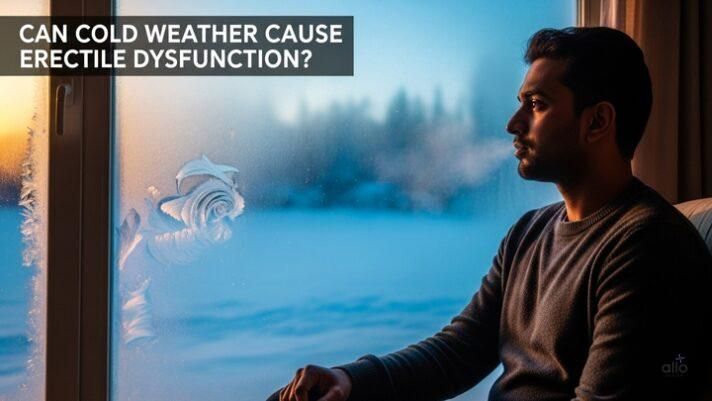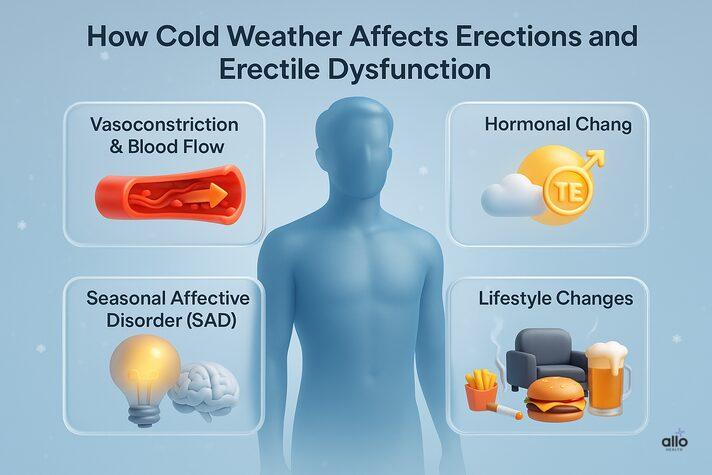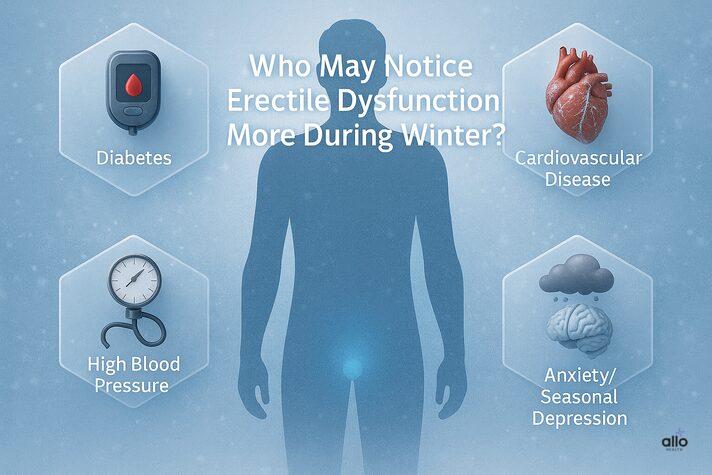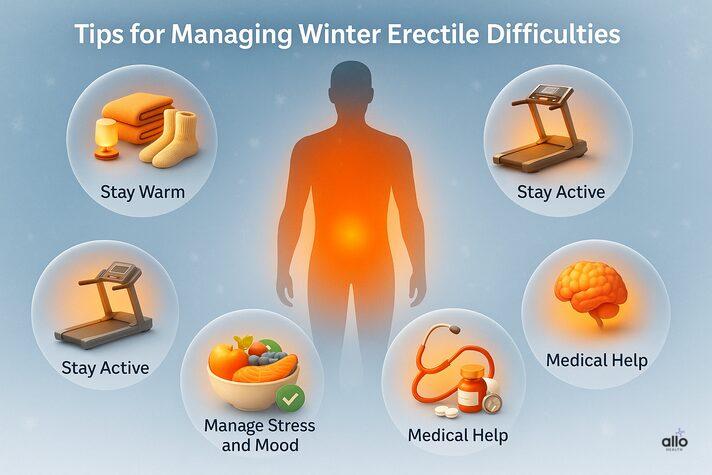Does Winter (Cold Weather) Impact Erectile Dysfunction? Seasonal Effects Explained
Written by Dr. Deepali Anand

Dr. Deepali is a medical writer and healthcare professional with a background in clinical surgery and patient care. Having transitioned from active clinical practice to medical communications, she specializes in bridging the gap between complex clinical data and patient education. Dr. Deepali is dedicated to creating evidence-based content that is grounded in scientific rigor and empathy, ensuring that sensitive topics like sexual wellness and mental health are accessible and empowering for every reader.
•
September 10, 2025
Our experts continually monitor the health and wellness space, and we update our articles when new information becomes available.

Quick Read
Yes, cold weather can cause erectile dysfunction, but it's typically temporary. Winter affects your body in three key ways: blood vessels narrow to conserve heat (reducing blood flow to the penis), testosterone and vitamin D levels drop due to less sunlight, and seasonal mood changes can decrease sexual desire. Men with existing health conditions like diabetes or heart disease may notice these effects more. The good news is that simple strategies like staying warm, exercising regularly, eating well, and managing stress can help maintain sexual function during colder months and normal function usually returns when temperatures warm up.
Can cold weather cause erectile dysfunction? Yes, it can, but not in a permanent way. If you’ve noticed erection difficulties happening more often during winter, you’re not alone. Cold temperatures affect blood flow, hormone levels, and even mood, which together can make erections harder to achieve or maintain.
In this article, we’ll explore why winter impacts sexual health, who may notice it more, and simple, practical tips to manage winter-related erectile difficulties so you can feel confident year-round.
Can Cold Weather Cause Erectile Dysfunction?
Yes, cold weather can sometimes cause or worsen erectile dysfunction. This happens because winter affects blood flow, along with other physiological and psychological changes.
Cold weather itself doesn’t cause permanent erectile dysfunction, but it can trigger or intensify temporary erection difficulties. In many cases, it also makes existing health issues more noticeable and can interfere with erections.
"According to Allo Health, nearly 1 in 2 men experience some form of erectile dysfunction, based on our internal clinical data of more than 2.5 lakh patients who have visited our clinics."
Let's dive deeper into how can cold weather cause erectile dysfunction.
Allo asks
Have you ever noticed erection problems during cold weather?

How Cold Weather Affects Erections and Erectile Dysfunction
1. Vasoconstriction and Blood Flow
In cold weather, your blood vessels narrow (a process called vasoconstriction) to conserve heat and energy. This allows the body to supply blood, nutrients, and oxygen to vital organs, but reduces circulation to areas like the penis.
As a result, it becomes harder to achieve and maintain an erection. Research[1] shows that in temperatures below 60°F, men may experience up to a 50% reduction in penile length and a 20–30% reduction in width. This “winter penis” is the body’s natural way of conserving heat during cold temperatures.
2. Hormonal Imbalances
Studies[2] show that testosterone levels dip during the winter months. They often peak between August and October and start declining by March. While these testosterone level fluctuations remain within the normal range, they can still influence sexual desire and erectile function.
Winter also means shorter days and less sunlight, which can lead to vitamin D deficiency. Vitamin D levels play a role in the production of serotonin and testosterone, both of which are important for sexual function[3]. Low levels of these hormones can affect sexual desire and erections.
3. Seasonal Affective Disorder (SAD)
Winter months with their short days and long nights can trigger Seasonal Affective Disorder (SAD), which is a form of seasonal depression.[4]
These “winter blues” often bring low energy, fatigue, and psychological stress, all of which negatively impact both desire and performance.
4. Lifestyle Changes
Winter often shifts routines in ways that negatively affect sexual health:
- Reduced physical activity weakens heart health and circulation, which are crucial for erections.
- Comfort food cravings for high-fat, high-sugar foods can lead to weight gain, high blood pressure, and poor vascular health, all ED risk factors.
- Disrupted sleep patterns interfere with testosterone production.
- Alcohol and smoking often increase in winter, but harm erectile function.
- Dehydration is common in cold weather as people drink less water. Dehydration reduces the energy and blood flow needed for sexual performance, causing dehydration-related erectile dysfunction.

Who May Notice Erectile Dysfunction More During Winter?
Men with existing health conditions that cause ED are more likely to feel winter’s effects on erections. These include:
- Diabetes
- High blood pressure
- Cardiovascular disease
- Circulation problems
Since ED is often an early sign of cardiovascular issues, cold weather can make these problems more pronounced.
Men prone to anxiety, stress, or seasonal depression may also experience more noticeable erection difficulties.

Tips for Managing Winter Erectile Difficulties
The good news is that cold-related ED is temporary and reversible. Here are some ways to manage it:
1. Stay Warm
- Keep your core body temperature stable to reduce vasoconstriction.
- Wear warm layers, especially around the lower body.
- Before intimacy, warm up with blankets, heated rooms, or even socks.
2. Stay Active
- Regular physical activity boosts heart health and improves blood circulation.
- Pelvic floor (Kegel exercise) exercises also enhance blood flow to the genital area.
3. Manage Stress and Mood
- Practice psychological stress-relieving activities like yoga, meditation, or hobbies.
- Light therapy or counseling can help with seasonal depression.
4. Lifestyle and Balanced Diet
- Limit alcohol and avoid smoking.
- Eat a heart-healthy diet with seasonal fruits, vegetables, foods rich in arginine (nuts, seeds, fish), and antioxidant-rich foods.
- Get sunlight exposure and consider vitamin D supplements to maintain vitamin D levels.
- Stay hydrated with warm teas and soups.
5. Medical Help
- If you already have ED, cold weather may worsen symptoms.
- Talk to your doctor about adjusting or monitoring ED medications(PDE5 inhibitors)
- Additional treatments like warm baths before intimacy can also help relax blood vessels and improve performance.
When to See a Doctor
Temporary cold-related changes are normal. But consult a doctor if:
- Erection problems persist beyond winter.
- Symptoms appear suddenly and severely.
- ED is accompanied by warning signs like chest pain, fatigue, or low libido.
The Allo Take
So, can cold weather cause erectile dysfunction? Yes, but usually only temporarily. Cold weather can affect blood flow, hormones, and mood, which together may cause erection difficulties.
The key thing to remember is that these seasonal changes are reversible. Once temperatures warm up, most men return to normal function. If symptoms continue, it may signal an underlying health issue that needs attention.
With healthy lifestyle habits, stress management, and medical support when needed, sexual well-being can be maintained all year round.
Disclaimer
The following blog article provides general information and insights on various topics. However, it is important to note that the information presented is not intended as professional advice in any specific field or area. The content of this blog is for general educational and informational purposes only. The content should not be interpreted as endorsement, recommendation, or guarantee of any product, service, or information mentioned. Readers are solely responsible for the decisions and actions they take based on the information provided in this blog. It is essential to exercise individual judgment, critical thinking, and personal responsibility when applying or implementing any information or suggestions discussed in the blog.
Most Asked Questions
Why can’t I get hard when it’s cold? .
Cold weather causes blood vessels to tighten, which reduces blood flow to the penis. This makes it harder to get or keep an erection. The effect is usually temporary and improves once you warm up
Why is my husband not getting erect with me during winter?
It may not be about you at all. Cold temperatures, reduced testosterone, seasonal depression, or even fatigue can all affect erections. Encourage open conversation and suggest simple steps like staying warm, being active, and managing stress. If it continues beyond winter, a doctor’s visit is a good idea.
What is the fastest way to manage winter-related erectile dysfunction?
The quickest fix is to warm up the body — heated rooms, blankets, or even warm socks can help. Staying active, drinking enough fluids, and reducing alcohol or smoking also make a big difference. For persistent issues, ED medications prescribed by a doctor may be needed.
Why am I suddenly struggling to get hard in the colder months?
If this happens mainly in winter, it’s often due to a mix of reduced circulation, lower vitamin D, and changes in mood. These are common seasonal effects. If the problem continues into warmer months, it could point to an underlying health issue worth checking.
Can cold weather cause permanent erectile dysfunction?
No, cold weather alone doesn’t cause permanent ED. The difficulties are temporary and usually resolve once circulation improves and temperatures rise. However, if erection problems continue year-round, it may signal conditions like diabetes, high blood pressure, or heart disease that need medical attention.


